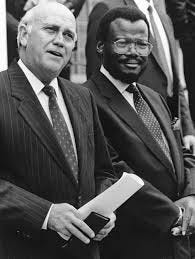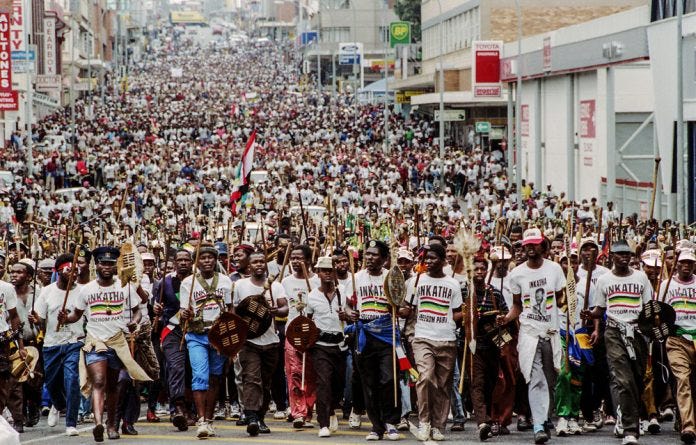NOT ALL ZULUS ARE CREATED EQUAL
Wiseman T Zondi examines the legacy of Prince Mangosuthu Buthelezi, and finds that there's more to dislike than to like about Prince Buthelezi's contributions to the history pages.
The post-apartheid moment was one of unlimited possibilities - so much so that many people were able to rewrite their histories and re-mythologise themselves.
Cue Prince Mangosuthu Buthelezi.
The founder and longtime leader of the Inkatha Freedom Party (IFP) took the new democratic dispensation as a gift. He proclaimed himself as having continued the legacy of the then-banned African National Congress (while Oliver Tambo reportedly did give him his blessing to start Inkatha, the ANC eventually distanced itself from Buthelezi). He called himself the person who single-handedly ensured Nelson Mandela's release, and sparked the flame that would lead to South Africa being a democratic nation (in actuality, there was no greater Black politician who was more of an obstacle to the 1994 democratic elections than Prince Buthelezi).
To be fair, Buthelezi was not the only person to use revisionist history to his advantage. F. W. de Klerk did it. White South Africans did it. Hell, even the ANC did it.
But nobody has enjoyed the spoils of revisionist history for as long, and for as uncritically, as Prince Buthelezi. When we collectively got fatigued from the "Rainbow Nation" fever dream, we skewered white South Africans for thinking that a vote in the sham 1992 "election" would act as a way to avoid culpability in upholding a racist system for half a century. We all knew that the ANC did bad things in exile, but we sighed, raised our shoulders, and reasoned that all was fair in love and war, even a few human rights abuses here and there.
We never truly gave de Klerk an opportunity to remake his image, and rightly so. The man was part of the apartheid machinery, and had benefited from it, long before he saw the writing on the wall in early 1990. His behind-the-scenes manipulations of the democratic process were known to us all, his denials aside. We hold him responsible for the conflicts in Natal in the early 1990s.
But interestingly enough, we don't hold his collaborator to the same level of responsibility. Said collaborator's name? One Mangosuthu Buthelezi.
We have freely available information that informs us that Buthelezi went to the apartheid government & told them he wanted to discredit the ANC, and by proxy, the negotiated settlement to end apartheid. Starting from the mid-1980s, Buthelezi sent young men from his organisation - check out why the IFP Youth Brigade was so feared - to a Namibian military base to be trained by the apartheid government. And what would those trained-to-kill soldiers do when they returned to home, sweet home? They'd assassinate prominent ANC members in the townships, of course.
The IFP would receive AK-47s and other military equipment from the apartheid government, and use those to stoke violence in the townships. And when I say "the IFP", I mean the followers of Prince Mangosuthu Buthelezi, because this was done with his knowledge and with his endorsement. The apartheid government didn't send millions of rands to an account that'd later be linked to Prince Buthelezi.
Don't believe me? Read this and this. Also read this about Operation Marion, so named because Prince Buthelezi was seen as a marionette - a puppet on strings operated by the apartheid state as a "respected black voice" who'd argue against the anti-apartheid movement that was actually making a difference, compared to his "black respectability politics" rhetoric that got him noticed as one of the "good blacks".
And remember those good old days when Prince Buthelezi wanted federalism for the KwaZulu province, and held the country hostage?
Pepperidge Farm remembers.
What irks me is not so much his plans to usurp apartheid that were immersed in respectability politics - going as far as legitimating the homeland system by being part of it as the so-called "Chief Minister" of the KwaZulu homeland, but expressing distaste at the June 1976 riots where schoolchildren rebelled against being taught in a language they didn't understand. It's not so much his gazillion and one attempts to act as a "freedom fighter", even though his entire strategy was to cozy up to the National Party and hope that someday, they'd see him as a political equal.
What irritates me the most about the Prince Mangosuthu Buthelezi image rehabilitation project is that he waxes lyrical about the great "Zulu nation", when thousands of Zulu people died at the hands of the Natal conflicts. Were those people any less Zulu, because they were ANC supporters? Was his comment about South Africa being saved from "disastrous consequences of unimaginable proportions" when he got part of what he wanted, pre-1994 elections, a statement of care towards the Zulu people who would've died if a civil war had broken out?
Nationalism is the reason why liberal democracy is in a decline, the world over. For that reason, it has always left a bitter taste in my mouth. Even Zulu nationalism - which should favour a black, Zulu, masculine-presenting man as myself - makes me uneasy. The reason for my unease is simple: all Zulus aren't created equal. Openly gay Zulu men don't get the social benefits that a staunchly heterosexual Zulu man does. In the early 1990s, Zulu folks who supported the ANC didn't get the social benefits that the Zulu folks who lived & breathed IFP did. And when nationalism gets to its absolute core, the difference is one between life and death. Literally.
Mondli Makhanya was right when he called Prince Buthelezi a "mass murderer". His statement was based on easily verifiable facts. The folks who marched to the City Press headquarters, though? They subtly (but obviously) threatened Makhanya with violence if he didn't stop writing about Prince Buthelezi. Nobody could convincingly argue against Makhanya on the points he made, not even Mkhuleko Hlengwa . (By the way, Mr Hlengwa, using the word "defamatory" and all the synonyms of the word you can find in the dictionary does not an argument make.)
Prince Buthelezi is in his late 90s. He will be dead sooner rather than later. And when that day comes, we will debate his legacy - and some of it won't look as glossy as it does in his parliamentary biography. The threat of having the entire IFP Youth Brigade on your case will no longer scare people. The fear of being doxxed on Twitter won't be as much of a factor as it currently is.
People will talk about the havoc that the IFP unleashed upon their families at a very pivotal time in our country's history. People will note their disgust at how Buthelezi was able to place the entire country under hostage, and then enjoy a decade as a government minister. People will hear the phrase "Prince Buthelezi was a controversial figure" and they'll actually tell us why.
Most of those folks will almost surely be Zulu.
Why? Because not all Zulus are created equal.
Some Zulus can get away with literal murder, and be perceived as heroes of the struggle against apartheid even though their actual contribution to the struggle was how much they held it back. And some Zulus? Well, they’re just collateral damage for the first kind.





